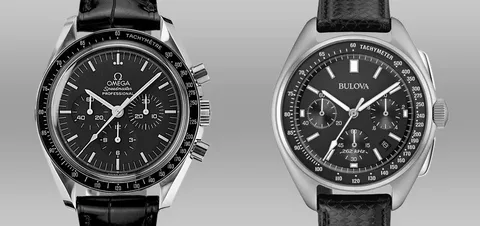When it comes to luxury timepieces, few names resonate with enthusiasts quite like Bulova and Movado. Both brands carry rich histories, strong reputations, and distinctive design philosophies that continue to attract collectors and casual buyers alike. Yet, when comparing bulova vs movado, buyers often find themselves torn between classic craftsmanship and modern minimalism.
This comprehensive guide dives deep into the strengths of each brand, their place in horology, and practical advice for choosing the right watch. We’ll also explore how to care for automatic watches properly with the help of accessories like a Mozsly watch winder, ensuring your investment stays in peak condition for years to come.
The Legacy of Bulova
Bulova was founded in New York in 1875 by Joseph Bulova, a visionary immigrant from Bohemia. From its early years, Bulova set itself apart with a commitment to precision and innovation. Among its achievements are:
- The Accutron: Introduced in 1960, it was the world’s first fully electronic watch, known for unmatched accuracy at the time.
- Space Connection: Bulova timing instruments were used by NASA during space missions, including the Apollo program.
- Craftsmanship and Design: Bulova has long been recognized for balancing elegant aesthetics with mechanical excellence.
Today, Bulova sits in a unique space within the watch market. It offers accessible pricing while delivering craftsmanship and innovation that appeals to those looking for value without compromising on quality.
The Distinct Identity of Movado
Movado, founded in Switzerland in 1881, has become synonymous with modern design. Its most famous creation is the Museum Watch, introduced in 1947 by artist Nathan George Horwitt. This minimalist design, featuring a single dot at 12 o’clock representing the sun at high noon, is both iconic and revolutionary.
Key highlights of Movado include:
- Modernist Aesthetic: Sleek, clean, and art-inspired designs appeal to those with a taste for modern luxury.
- Swiss Heritage: As a Swiss brand, Movado carries a reputation for reliability and precision.
- Artistic Influence: Movado is not just about telling time but about making a statement of sophistication and design philosophy.
While Movado typically positions itself in the fashion-forward luxury segment, it still carries horological credibility, making it a favorite among style-conscious collectors.
Bulova vs Movado: Design Philosophy
One of the clearest distinctions between Bulova and Movado lies in their design ethos.
- Bulova often appeals to traditionalists. Its collections feature both classic dress watches and innovative models like the Precisionist, known for its sweeping second hand and unmatched accuracy. The designs lean toward versatility, suitable for both professional and casual wear.
- Movado, on the other hand, caters to minimalism lovers. Its Museum Dial watches are bold in their simplicity, creating an instantly recognizable identity. Movado’s emphasis on art and modernism makes it particularly attractive for those seeking elegance without excess detail.
In essence, Bulova designs lean toward heritage and functionality, while Movado emphasizes style and statement.
Movement and Technology
Both brands offer a variety of quartz and automatic movements, but their approach differs.
- Bulova Movements: Known for its Precisionist quartz movement, which offers accuracy up to 10 seconds per year, far exceeding standard quartz. Bulova also produces automatic watches with Japanese Miyota movements, appreciated for reliability and affordability.
- Movado Movements: Primarily powered by Swiss quartz or automatic ETA movements, Movado places more emphasis on design than innovation in movement technology. However, its Swiss-made roots provide strong credibility in reliability.
If precision and mechanical performance are priorities, Bulova often has the upper hand. For those valuing Swiss heritage with timeless design, Movado becomes the preferred choice.
Price and Value
Another important factor in the Bulova vs Movado debate is pricing.
- Bulova: Offers a broad range, generally from $200 to $1,500, making it one of the most accessible luxury-inspired watchmakers. Its value proposition is strong, especially with features like sapphire crystals, water resistance, and advanced movement technology.
- Movado: Typically priced slightly higher, with many models starting around $400 and extending up to $2,500. Much of Movado’s value lies in its artistic design and brand identity, which appeal to those who see their watch as more than just a timekeeper.
Collectibility and Brand Image
- Bulova enjoys popularity among those who appreciate horological milestones and American watch history. Collectors often seek out vintage Accutron models or limited editions tied to space exploration.
- Movado has carved its identity in the fashion and art world. While it may not attract the same level of technical collectors as Bulova, it remains a highly respected name in design-conscious circles.
Ultimately, the brand you choose will depend on whether you value innovation and heritage (Bulova) or design and prestige (Movado).
The Role of Watch Accessories: Why a Winder Matters
For those who own automatic watches from either brand, keeping them wound is essential. Unlike quartz watches, automatic watches rely on motion to keep ticking. If left unworn, they will stop, requiring you to reset the time and date.
This is where a <a href=”https://www.mozsly.com/collections/all-watch-winders”>Mozsly watch winder</a> becomes a must-have accessory. High-quality winders:
- Keep automatic watches running smoothly even when not worn.
- Prevent lubricants inside the movement from settling, prolonging the life of the mechanism.
- Offer stylish storage solutions that complement the luxury of the watch itself.
For Bulova or Movado automatic owners, investing in a reliable winder ensures your timepiece remains ready to wear at all times.
Practical Buying Tips
- Try Before You Buy – Bulova watches often wear slightly larger, while Movado models are slimmer and more minimalist. Always test wrist comfort.
- Consider Your Wardrobe – If you dress in business or formal attire, Movado’s sleek look may align better. For versatile styling, Bulova offers more range.
- Look at Movement Preferences – Quartz lovers may lean toward Movado, while those who appreciate innovative quartz or reliable automatics may prefer Bulova.
- Maintenance Planning – Remember, automatic models require care. Owning a winder will reduce the hassle of resetting your timepiece frequently.
- Budget Wisely – Don’t just consider the price of the watch but also long-term ownership costs like servicing, accessories, and storage.
Final Verdict: Bulova vs Movado
The choice between Bulova and Movado ultimately comes down to personal preference.
- Choose Bulova if you value historical innovation, technical accuracy, and versatile designs.
- Choose Movado if you want a statement piece rooted in minimalist design and Swiss elegance.
No matter which brand you select, pairing your watch with the right care tools, like a quality winder, ensures it will remain a reliable and stylish companion for years to come.

















